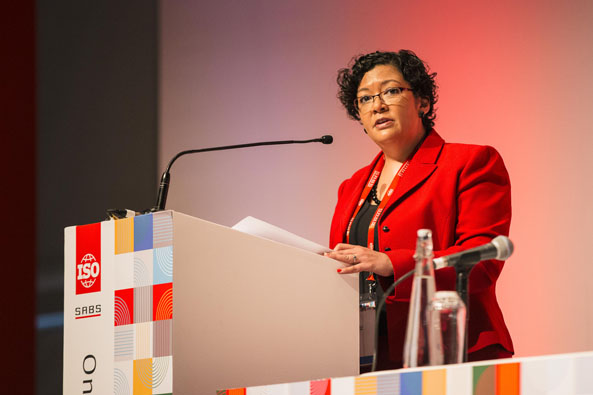Quality Assurance Provides Trust and Confidence Which Enable Global Trade |
| The Co-Administrator of the South African Bureau of Standard (SABS), Ms Jodi Scholtz says quality assurance provides trust and confidence which enables global trade and support each element of the value chain in standardisation. Scholtz was addressing the International Organisation of Standardisation’s (ISO) General Assembly in Cape Town today.
ISO is the international standards-setting body, formed in 1947.It has a catalogue of ISO standards in excess of 22500. SABS plays an important role in international standardisation and participates in 429 ISO committees, holds 10 secretariat and 11 chairperson roles. According to Scholtz, quality assurance also provides trust from sourcing, production to distribution and consequently enabling healthy competition while safeguarding users and consumers from sub-standard products and services. “Without appropriate standards it will be impossible to address other multiple challenges at a global, regional and national level since standardisation provides the tools to achieve sustainable development, to counter the immediate threat posed by climate change and, amongst others, secure gender equality and optimal healthcare,” said Scholtz. Scholtz added that ISO members needed to work together to secure shared perspectives and urgent collaborative interventions to address the problems that are increasingly impacting and adversely affecting society. “We do not have any alternative, other than to work together in a collaborative multi-stakeholder approach to shared global problems. The ISO, with a membership of more than 160 national standards bodies, spread across the world, is undoubtedly one such collaborative, multi-lateral institution which has and should increasingly provide a developmental approach to the common problems faced by both developing and developed countries,” she said. Scholtz pointed out that collaboration was critical given the pre-eminent role that standards play in conformity assessment which itself must underpin a global sustainable and equitable economic growth path.
Enquiries: Or Ms Roshelle Pillay Issued jointly by the Department of Trade and Industry (the dti) and the South African Bureau of Standards (SABS) |
MENUMENU
- Know the dtic
- Media Room
- Financial Assistance
-
-
- INCENTIVES
- 12I Tax Allowance Incentive
- Agro Processing Support Scheme (APSS)
- Aerospace Industry Support Initiative (AISI)
- Aquaculture Development and Enhancement Programme (ADEP)
- Automotive Investment Scheme (AIS)
- Black Industrialists Scheme (BIS)
- Capital Projects Feasibility Programme (CPFP)
- Critical Infrastructure Programme (CIP)
- Clothing, Textiles, Footwear and Leather Growth Programme (CTFLGP)
- Export Marketing and Investment Assistance (EMIA)
- Film Incentive
- INCENTIVES
-
- INCENTIVES
- Global Business Service (GBS)
- Innovation and Technology Funding instruments
- Manufacturing Competitiveness Enhancement Programme (MCEP)
- Production Incentive (PI)
- Manufacturing Support Programme (MSP)
- Sector Specific Assistance Scheme (SSAS)
- Strategic Partnership Programme (SPP)
- Support Programme for Industrial Innovation (SPII)
- Technology and Human Resource for Industry Programme (THRIP)
- Workplace Challenge Programme (WPC)
- Khoebo Innovation Promotion Programme (KIPP)
- INCENTIVES
-
-
- Sectors and Service
- Sectors
- B-BBEE
- Special Economic Zones
- Industrial Development
- Trade and Export
- Legislation and Business Regulation
- Bills and Acts
- Statutory Committees
- National Liquor Authority
- Proposed prohibition of the use of certain EU names
- Institutional Support for Business
- South African Council for Space Affairs
- InvestSA
- Non-Proliferation
- The South African Council For Space Affairs
- Procurement and Tenders
- Research and Statistics


